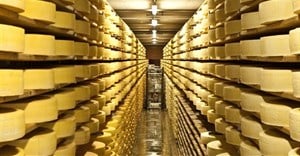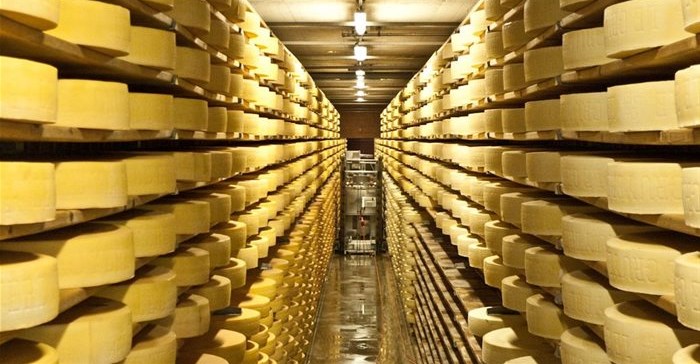For most cheese lovers, taste is the thing. Whether it's a tangy blue stilton or a creamy oozing camembert, the most important element is the eating. But cheese has profound political and economic properties too, with implications for international trade deals and commerce.
The taste of gruyere, for example, can depend on where you eat it. In Europe, it has a particular taste that comes from being a Swiss cheese (a French version is also available) made by heating Swiss cow’s milk in a copper vat and then ripening the cheese in Swiss cellars with the humidity of a natural cave.
In the US though, gruyere means any nutty, pale yellow cheese made from cow’s milk, and it can be produced anywhere in the world. That definition was recently given legal weight by the US court system after representatives of Swiss and French manufacturers tried to win protected status for the word “gruyere”. This would have restricted the use of the term in the US for cheeses produced in particular parts of Switzerland and France.
The European consortiums’ aim was to extend the kind of prize status grueyere enjoys closer to home. For in Switzerland and the EU, gruyere is protected by a geographical label which certifies that production, including the sourcing of the raw materials, takes place in a specific geographical area. It is a means of preserving cultural heritage and expertise, which in the case of gruyere, is said to go back to the 12th century.
In the US however, the Dairy Export Council argued that vast quantities of cheese made in all kinds of places have been labelled and sold as gruyere for decades. They argued that the name “gruyere” is generic and cannot be owned by anyone. The US court sided with them.
The case highlights the clear difference between the ways Europeans and Americans regulate geographical names of traditional foods. The contrasting views had already been a tricky element in recent negotiations for a proposed trade deal between the US and the EU.
For in Europe, many products – including hams, cheese and wines – receive strong levels of legal protection to preserve the reputations and traditions that have sometimes been built over centuries. They are considered “products with a story” and the names of the geographical locations where they are produced are given intellectual property rights.
The US follows a very different set of rules. There, firms use European geographical names (not only gruyere, but also parmesan, asiago, feta and fontina, among others) to label cheeses that have been produced far from their original homes. The reason is that most US consumers view these names as generic – to them they just describe the features of the product, like whether it melts well, or has a salty taste.
The economic stakes are high on both sides of the Atlantic. To Europeans, the absence of legal protection in the US leads to unacceptable exploitation of Europe’s cultural legacy and costs manufacturers of cheese a lot of money, as they can’t rely on exclusive rights over names which attract customers.
On the other hand, American cheese producers are concerned that caving into Europeans’ demands to monopolise such names would be unfair as they wouldn’t be able to continue using terms that they perceive as generic. Introducing legal protection would offer European cheese producers an unfair competitive edge.
It would, in American eyes, essentially be a trade barrier that would drive up customer prices by forcing many US producers to undergo an expensive rebranding process. According to one study, the American dairy industry could lose as much as $20bn (£16bn) if the Europeans were successful in restricting the use of common cheese names.
Hard cheese
A US Consortium for Common Food Names has even been set up specifically to represent the interests of American producers and farmers to lobby US lawmakers into denying legal protection for numerous European geographical terms, not only for cheeses. It obviously welcomed the gruyere decision enthusiastically.
The group backs up its stance by arguing that the US was founded on the work of immigrants who brought authentic and artisan traditions from around the world, including many of the processes protected in Europe.
And it is no doubt true that when Europeans emigrated to the US in the 19th and 20th centuries, many continued to produce the delicacies they had made back home. They brought with them traditional manufacturing techniques and the names they were used to.
But surely this argument cannot be stretched to the point of denying Europeans all rights over geographical terms which still have a reputation further afield. Not all of the US businesses which use famous European geographical names were founded by European migrants.
Samuel Samiai Andrews 24 Feb 2021
One possible compromise might be to attempt to reach bilateral agreements allowing only those US producers created by European migrants to use the labels in question.
But for the time being, the impasse continues. European producers will strive to get the protection in the US that they think their delicacies deserve – and their American counterparts will fiercely reject any move to restrict their freedom to use the labels they wish to use. There is still a hearty appetite for this trans-Atlantic food fight.
This article is republished from The Conversation under a Creative Commons license. Read the original article.

































